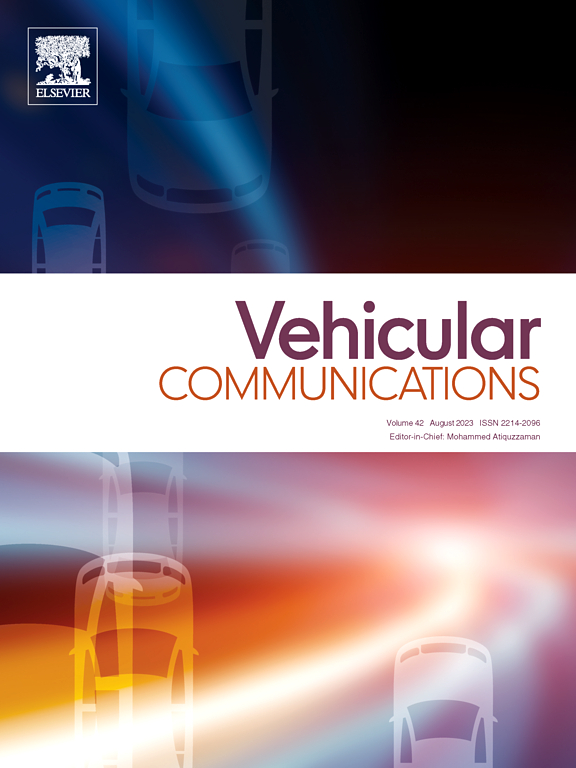mec辅助车辆网络双可靠性冗余任务卸载
IF 6.5
2区 计算机科学
Q1 TELECOMMUNICATIONS
引用次数: 0
摘要
随着智能汽车的兴起和发展,车辆的计算能力迅速大幅提高。有人提出了车对车(V2V)卸载,即把计算密集型任务卸载到利用率低的车辆上。然而,V2V 卸载面临着任务传输可靠性和任务计算可靠性的挑战。在 V2V 卸载中,任务是通过 V2V 通信传输的,由于车辆之间的网络拓扑和信道条件快速变化,V2V 通信具有不稳定性和不稳定性,导致任务传输延迟时变,甚至失去连接。因此,在给定的延迟约束条件下完成 V2V 卸载具有挑战性。此外,现实中多样化的车辆环境总是伴随着恶意车辆,这会对 V2V 卸载造成无法弥补的伤害。因此,本文提出了一种名为 "双可靠性冗余任务卸载(RTODR)"的 V2V 任务卸载方案,旨在最大限度地降低任务卸载成本,同时确保移动边缘计算(MEC)辅助车载网络中的任务传输可靠性和任务计算可靠性。具体来说,对于计算任务而言,只有在任务截止日期内通过 V2V 连接成功传输任务,V2V 连接才被认为是可靠的。为确保任务计算的可靠性,来自可信服务车辆的任务计算结果被认为是可靠的。然后,我们对具有双可靠性的任务卸载成本最小化(MTOCD)问题进行了正式建模,并将其数学化为一个多目标优化问题。随后,我们提出了一种名为双可靠性卸载(DRO)的启发式冗余任务卸载算法来解决该问题。最后,我们通过综合实验证明,与其他方法相比,RTODR 的成本更低。本文章由计算机程序翻译,如有差异,请以英文原文为准。
Redundant task offloading with dual-reliability in MEC-assisted vehicular networks
With the rise and development of intelligent vehicles, the computation capability of vehicles has increased rapidly and considerably. Vehicle-to-Vehicle (V2V) offloading, in which computation-intensive tasks are offloaded to underutilized vehicles, has been proposed. However, V2V offloading faces the challenges of task transmission reliability and task computation reliability. In V2V offloading, tasks are transmitted via V2V communication, which is volatile and spotty because of rapidly changing network topology and channel conditions between vehicles, resulting in time-varying delays of task transmission and even loss of connectivity. Thus, it is challenging to complete V2V offloading within a given delay constraint. In addition, the realistic diverse vehicular environment always comes with malicious vehicles, which can cause irreparable harm to V2V offloading. Therefore, in this paper, we propose a V2V task offloading scheme called Redundant Task Offloading with Dual-Reliability (RTODR), aiming to minimize task offloading costs while ensuring both task transmission reliability and task computation reliability in a Mobile Edge Computing (MEC)-assisted vehicular network. Specifically, for a computation task, a V2V connection is considered reliable only if the task can be successfully transmitted via the V2V connection within the deadline of the task. To ensure task computation reliability, task computation results from a trusty service vehicle are considered to be reliable. Then we formally model a Minimizing Task Offloading Cost with Dual-reliability (MTOCD) problem, which is mathematically formulated as a multi-objective optimization problem. Afterward, we propose a heuristic redundant task offloading algorithm, named Dual-Reliability Offloading (DRO), to solve the problem. Finally, comprehensive experiments have been conducted to demonstrate that RTODR achieves lower costs compared with other approaches.
求助全文
通过发布文献求助,成功后即可免费获取论文全文。
去求助
来源期刊

Vehicular Communications
Engineering-Electrical and Electronic Engineering
CiteScore
12.70
自引率
10.40%
发文量
88
审稿时长
62 days
期刊介绍:
Vehicular communications is a growing area of communications between vehicles and including roadside communication infrastructure. Advances in wireless communications are making possible sharing of information through real time communications between vehicles and infrastructure. This has led to applications to increase safety of vehicles and communication between passengers and the Internet. Standardization efforts on vehicular communication are also underway to make vehicular transportation safer, greener and easier.
The aim of the journal is to publish high quality peer–reviewed papers in the area of vehicular communications. The scope encompasses all types of communications involving vehicles, including vehicle–to–vehicle and vehicle–to–infrastructure. The scope includes (but not limited to) the following topics related to vehicular communications:
Vehicle to vehicle and vehicle to infrastructure communications
Channel modelling, modulating and coding
Congestion Control and scalability issues
Protocol design, testing and verification
Routing in vehicular networks
Security issues and countermeasures
Deployment and field testing
Reducing energy consumption and enhancing safety of vehicles
Wireless in–car networks
Data collection and dissemination methods
Mobility and handover issues
Safety and driver assistance applications
UAV
Underwater communications
Autonomous cooperative driving
Social networks
Internet of vehicles
Standardization of protocols.
 求助内容:
求助内容: 应助结果提醒方式:
应助结果提醒方式:


